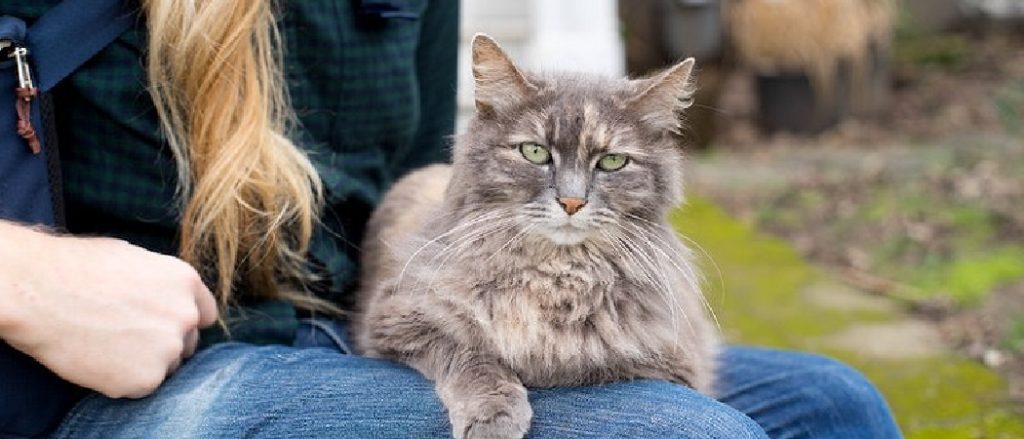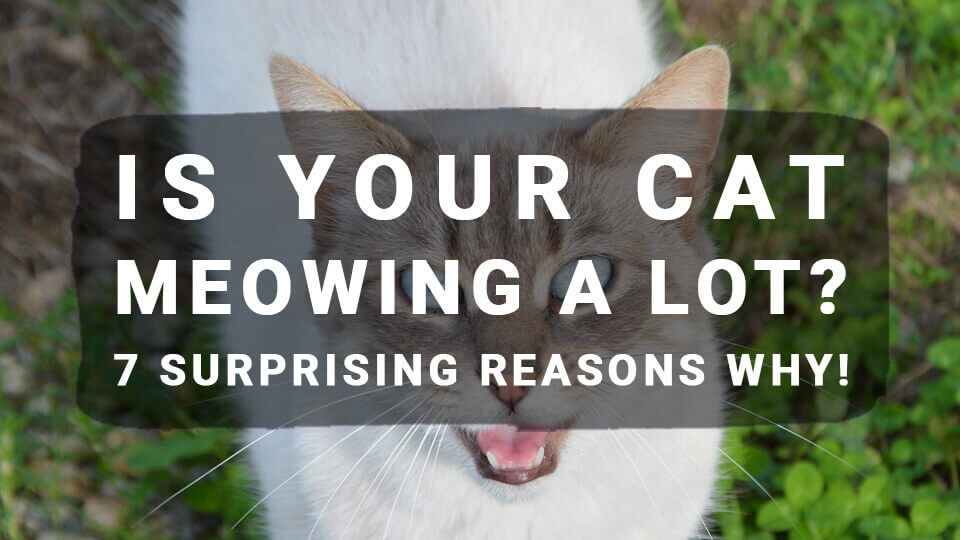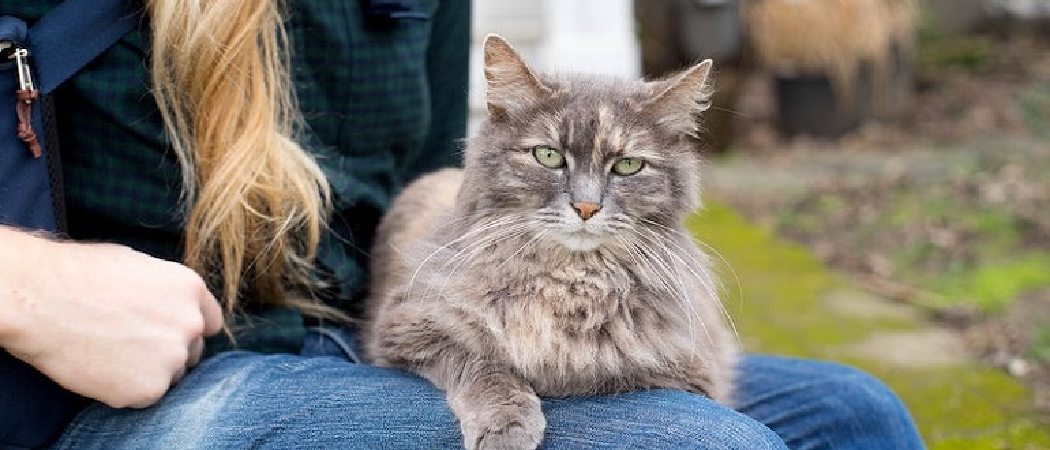Cats meow in the litter box to communicate their needs or discomfort.

Understanding Cat Behavior
Cats may meow in the litter box to communicate various things, such as discomfort, anxiety, or even happiness. Understanding cat behavior helps decipher the reason behind their vocalizations in this specific location.
Understanding your cat’s behavior is essential in providing them with proper care and maintaining a healthy relationship. While cats are known to be independent creatures, they still rely on their human companions to interpret their needs and emotions. One common behavior of cats that can be perplexing is meowing in the litter box. This behavior can be indicative of various factors that require attention and understanding.
The Importance Of Understanding Your Cat
Being able to understand your cat’s behavior is crucial for several reasons. Firstly, it allows you to identify and address any underlying health issues or discomfort that your cat might be experiencing. Unusual meowing in the litter box could be a sign of urinary tract infection, constipation, or even arthritis. By recognizing such signals, you can promptly seek assistance from a veterinarian, ensuring your cat’s well-being.
Secondly, understanding your cat’s behavior helps you cater to their emotional and psychological needs. Cats may meow in the litter box as a way of communicating their anxiety, stress, or frustration. By recognizing these signs, you can create a more comfortable environment for your cat and find strategies to help them feel more secure and at ease.
Common Reasons For Cat Meowing In The Litter Box
There are several common reasons why cats may meow in the litter box:
- 1. Attention-seeking: Cats are known for their ability to grab their owners’ attention, and meowing in the litter box can be a way for them to seek your presence and interaction.
- 2. Desire for privacy: Cats value their privacy, and meowing in the litter box could be their way of signaling a need for solitude. Consider providing covered litter boxes or moving the litter box to a quieter location.
- 3. Litter box aversion: Sometimes, cats may meow in the litter box if they dislike the litter texture, scent, or cleanliness. Experimenting with different litter types or regularly scooping the box can help alleviate this issue.
- 4. Territorial marking: Meowing in the litter box may also serve as a form of territorial marking. This behavior is more common in unspayed or unneutered cats and can be addressed by having them spayed or neutered.
- 5. Pain or discomfort: As mentioned earlier, meowing in the litter box can indicate underlying health issues such as urinary tract problems or constipation. If you notice any changes in your cat’s litter box behavior, it’s crucial to consult a veterinarian.
By understanding these common reasons for cat meowing in the litter box, you can better address your cat’s needs and improve their overall well-being. Remember to observe your cat’s behavior closely and consult a veterinarian if necessary. A little bit of understanding goes a long way in nurturing a happy and healthy feline companion.

Credit: www.longanimal.com
Medical Issues
When it comes to understanding your cat’s behavior in the litter box, it’s important to consider potential medical issues that may be causing excessive meowing. Cats use vocalization as a way to communicate their needs, and if they are meowing while in the litter box, it could be a sign of an underlying health problem. In this section, we’ll explore some of the medical issues that may be causing your cat to meow in the litter box.
Urinary Tract Infections
One of the common medical issues that can cause cats to meow in the litter box is a urinary tract infection (UTI). Cats with a UTI may experience pain or discomfort while urinating, leading to excessive vocalization. UTIs can be caused by bacteria entering the urethra, but they can also be a result of bladder stones or other underlying conditions.
If your cat is meowing in the litter box and exhibiting other symptoms such as frequent urination, blood in the urine, or urinating outside the litter box, it’s crucial to consult with your veterinarian. They will be able to diagnose a UTI through a physical examination and may prescribe antibiotics or other treatments to alleviate the infection.
Defecation Problems
In addition to urinary issues, cats may also meow in the litter box due to defecation problems. Constipation, diarrhea, or other digestive issues can cause discomfort for your cat and prompt them to vocalize their distress while attempting to eliminate waste.
If you notice your cat meowing specifically during the defecation process, it’s essential to assess their stool consistency and frequency. Constipation can be a result of dietary issues, dehydration, or an underlying medical condition. On the other hand, diarrhea may indicate an infection or a reaction to something they’ve ingested.
It’s always important to consult with your veterinarian if your cat is experiencing recurring defecation problems. They will be able to diagnose the underlying cause and recommend appropriate treatment options, such as dietary changes, medication, or further investigations if necessary.
Pain Or Discomfort
Finally, meowing in the litter box may also be a sign that your cat is experiencing pain or discomfort. Cats are naturally inclined to hide signs of illness or injury, but vocalization while using the litter box can be a clear indicator that something is wrong. The pain or discomfort may stem from a variety of sources, including arthritis, urinary stones, or even a previous negative experience associated with the litter box.
If your cat continues to meow in the litter box and appears agitated or uncomfortable, it’s crucial to have them examined by a veterinarian. They will conduct a thorough physical examination and may recommend further tests or imaging to identify the underlying cause of the pain or discomfort. Treatment options will be tailored to address the specific issue your cat is facing.
Environmental Factors
When it comes to understanding why your cat meows in the litter box, it’s important to consider the various environmental factors that could be playing a role in this behavior. Cats are highly sensitive creatures, and even small changes in their surroundings can affect their mood and habits. In this article, we will explore three key environmental factors that may contribute to your cat’s meowing in the litter box: Litter Box Preferences, Litter Box Cleanliness, and Location and Access.
Litter Box Preferences
Cats can be quite particular about their litter box preferences. Some cats have a strong preference for certain types of litter or litter box designs. If your cat meows during or after using the litter box, it may be worth considering whether they are unhappy with the litter box set-up. Here are a few factors to consider:
- Litter type: Some cats prefer a specific type of litter, such as clumping, non-clumping, scented, or unscented. Experiment with different types of litter to see if your cat’s meowing decreases.
- Litter depth: Cats generally prefer a litter box with enough litter depth to accommodate their digging and burying behavior. Make sure the litter is deep enough for your cat’s comfort.
- Litter box size: Ensure that the litter box is large enough for your cat to move comfortably. Cats may feel cramped or confined in small litter boxes, leading to meowing.
Litter Box Cleanliness
A clean litter box is essential for maintaining your cat’s hygiene and overall satisfaction. Cats are clean animals, and they may meow in the litter box to express their discomfort with a dirty environment. Here are a few tips for keeping the litter box clean:
- Scoop regularly: Remove waste from the litter box daily to keep it clean and odor-free. Cats may meow if they can’t find a clean spot to do their business.
- Change litter frequently: Replace the litter at least once a week, or more frequently if necessary. Some cats may meow if the litter becomes too soiled or saturated with urine.
- Clean the litter box: Wash the litter box with mild soap and water regularly to remove any lingering odors that may deter your cat from using it.
Location And Access
The location and accessibility of the litter box play a crucial role in your cat’s litter box behavior. Cats prefer a quiet and private environment to do their business without any disturbances. Consider the following factors:
- Placement: Choose a quiet and low-traffic area of your home to place the litter box. Cats may meow if the litter box is located in a noisy or busy area.
- Avoid obstacles: Ensure that the litter box is easily accessible to your cat, especially if they have mobility issues or are senior cats. Obstacles such as closed doors or stairs could cause frustration and meowing.
- Multiple litter boxes: If you have multiple cats, provide each cat with their own litter box. Some cats may meow if they have to share a litter box with other cats.

Credit: www.amazon.com
Addressing The Issue
Cats are known for their wide range of vocalizations, but when your furry friend starts meowing while in the litter box, it can be both puzzling and concerning. This peculiar behavior may indicate that there is an underlying issue that needs to be addressed. In this article, we will explore a few strategies to help you understand and resolve your cat’s meowing in the litter box.
Consulting A Veterinarian
If your cat suddenly starts meowing excessively or exhibits any unusual behavior in the litter box, it’s important to consult a veterinarian. Excessive meowing can be a sign of potential health problems, such as urinary tract infections, gastrointestinal discomfort, or even anxiety issues. A professional evaluation can help rule out any underlying medical conditions that may be causing your cat’s distress.
Modifying The Litter Box Setup
Once medical concerns have been addressed, it’s time to take a closer look at your cat’s litter box setup. Cats can be quite particular about their litter box preferences, and any discomfort or dissatisfaction can cause them to meow incessantly. Here are a few modifications you can make to improve your cat’s litter box experience:
- Ensure the litter box is spacious enough for your cat to move around comfortably.
- Use a litter box with low sides to allow easy access for your cat, especially if they are older or have mobility issues.
- Experiment with different types of litter to find the one that your cat prefers. Some cats may have a preference for clumping litter, while others may prefer non-clumping or natural alternatives.
- Regularly clean the litter box to maintain cleanliness and prevent any unpleasant odors that may discourage your cat from using it.
- Consider providing multiple litter boxes in different areas of your home, especially if you have multiple cats, to ensure accessibility and reduce competition.
Creating A Calm And Stress-free Environment
Cats are sensitive creatures, and stress can manifest in various ways, including excessive vocalization. If your cat’s meowing in the litter box seems to be triggered by stress or anxiety, creating a calm and stress-free environment can help alleviate their discomfort. Here are some strategies to consider:
- Create designated quiet spaces where your cat can retreat to when they need some uninterrupted alone time.
- Provide interactive toys and engaging activities to help alleviate boredom and provide mental stimulation.
- Use pheromone diffusers or sprays specifically designed for cats to create a relaxing atmosphere.
- Establish a consistent routine for feeding, playtime, and litter box maintenance to provide a sense of security and predictability.
- Avoid sudden changes or disruptions in the household environment, such as moving furniture or introducing new pets, as these can cause stress for your cat.
By implementing these strategies and patiently observing your cat’s behavior, you can identify the underlying cause of their meowing in the litter box and take appropriate steps to address the issue. Remember, cats are individuals with unique preferences, so it may require some trial and error to find the right solution for your furry friend.
Take the time to consult with a veterinarian and make necessary adjustments to improve your cat’s litter box experience. With a little extra effort and care, you can create a peaceful and harmonious environment for your beloved feline companion.

Credit: meowkai.com
Frequently Asked Questions For Why Does My Cat Meow In The Litter Box
Why Does My Cat Meow In The Litter Box?
When your cat meows in the litter box, it could be a sign of discomfort or anxiety. It might indicate a medical issue, such as a urinary tract infection or constipation. It’s also possible that your cat is trying to get your attention or communicate something to you.
Checking with a veterinarian can help determine the cause of this behavior.
Is It Normal For Cats To Meow In The Litter Box?
While some cats may vocalize in the litter box occasionally, excessive meowing can indicate a problem. It’s not typical behavior for a cat to meow excessively or continuously while using the litter box. If your cat is meowing excessively in the litter box, it’s worth investigating to rule out any underlying health issues or discomfort.
How Do I Stop My Cat From Meowing In The Litter Box?
To address excessive meowing in the litter box, ensure that your cat’s litter box is clean, comfortable, and located in a quiet area. Some cats may benefit from using a covered litter box to provide them with privacy. If the meowing continues, consult with your veterinarian to rule out any medical conditions or behavioral issues that may require further attention.
Conclusion
To sum it up, it is perfectly normal for cats to meow in the litter box, and it can be for various reasons. From seeking attention to expressing discomfort or anxiety, meowing can be their way of communicating with us.
The key is to observe their behavior and provide a comfortable and stress-free litter box environment. Remember, a happy cat means a happy home! So, pay attention to your feline friend and ensure their litter box needs are met.

